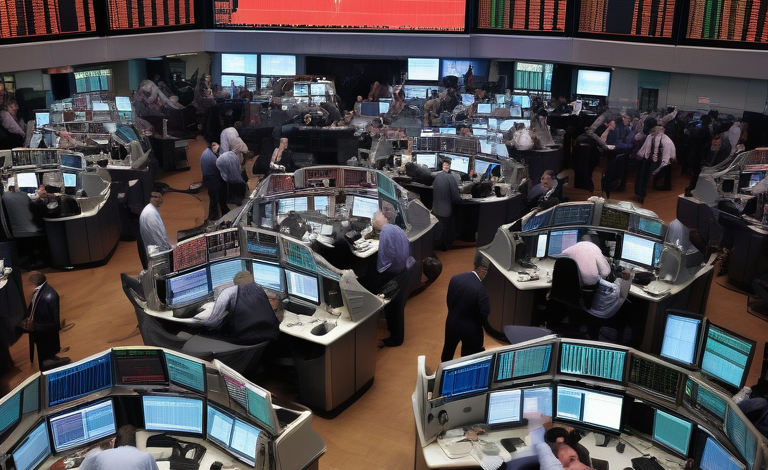Stock Market News: Dow Plunges 1,000 Points Today

Key Highlights
- The Dow Jones Industrial Average had its largest drop since September 2022, falling over 1,000 points.
- This big fall happened because people are worried about a possible recession in the U.S. and a selloff in global markets.
- The tech-heavy Nasdaq Composite also saw a large decline, dropping more than 3%, with AI-related stocks taking a big hit.
- Japan’s Nikkei 225 index had its worst trading day since the “Black Monday” in 1987, dropping by over 12%.
- There was a rise in market volatility. This is shown by the CBOE Volatility Index (VIX) reaching its highest level since the start of the COVID-19 pandemic in 2020.
Overview of Today’s Market Meltdown
The Dow Jones Industrial Average fell sharply today, dropping over 1,000 points. This is its biggest loss in almost two years. The drop did not just affect the Dow; it caused a global market meltdown, hitting major stock markets in Asia and Europe hard.
Investors are worried about the U.S. economy’s stability. The fears grew after last week’s July jobs report came out weak. There is also uncertainty about what the Federal Reserve will do with interest rates. These factors triggered today’s market downturn. Many sectors faced big losses, especially tech stocks, which saw significant cuts in their market cap.
S&P 500 and Nasdaq: How They Fared Amidst the Turmoil
Today, the stock market faced more trouble beyond the Dow Jones Industrial Average. Other big indexes like the S&P 500 and the Nasdaq were also affected. Both of these indexes saw big losses, which showed the fear that investors are feeling.
The S&P 500, which shows a wider view of the U.S. economy compared to the Dow, dropped by more than 3%. This loss wiped out all its gains for the year. It was the biggest loss for the S&P since September 2022. This shows just how much the market uncertainty is affecting investors everywhere.
The Nasdaq Composite, which is focused on tech companies, also suffered. It fell by over 3%. This is a bit expected since the tech sector has helped the market grow this year. However, with interest rates going up and fears of a slowdown, investors are changing their plans. This is leading to more ups and downs in the Nasdaq.
Key Factors Influencing Today’s Market Performance
Many things came together to create a big problem for the stock market today. Worries about a possible U.S. recession were a major reason, but other global events made things worse.
Last week, the Bank of Japan made a surprising choice to change its money policy. This move caused ripples in global markets. With rising tensions around the world and concerns about how companies are doing, many investors felt unsure. This made them move their money to safer options, leading to a lot of selling in the market.
Interest Rate Speculations and Their Impact on the Market
The way the Federal Reserve manages interest rates has always affected how the market behaves, and today was the same. Last week, the central bank decided to keep interest rates steady to fight inflation. However, this decision has made some investors worry about a possible recession.
There are also more worries that the Fed might not be reading economic signs correctly. Recent information, like the disappointing July jobs report released on Friday, has raised doubts about the U.S. economy’s strength. Some analysts believe that the Fed is not acting fast enough, sticking to a tough position on interest rates while signs of a recession appear.
Because of this uncertainty, the market feels unclear about what the Fed will do next. Investors do not know if the central bank will keep its tough stance or shift to a more supportive approach to help the economy grow. This unclear situation is making investors nervous, leading to today’s selloff as they try to lower their risk.
Middle East Conflict
Ongoing political challenges, especially in the Middle East, are causing concern in global markets. Though not the main reason, this conflict raises worries about supply chains, which are already under pressure. This situation could harm the weak global economy.
The uncertainty from the conflict is already affecting oil prices. Oil prices are important because they support economic activity around the world. Just the chance of supply problems or big price changes makes it harder for investors to understand the global economic situation.
Right now, markets also face other issues, like fears of a recession and changing interest rates. Since global markets are connected, any political trouble in one area can impact financial feelings everywhere. This is clear from how the markets are reacting today.
Global Economic Indicators That Led to Today’s Sell-Off
Beyond the borders of the U.S., there are worrying signs in the global economy. These signs are making the situation in equity markets worse. The issues outside the U.S. are mixing with economic worries at home. This is increasing the anxiety among investors today.
Emerging markets, which usually show how the global economy is doing, are slowing down. This has raised worries about how it might affect the global economy as a whole. This slowdown, along with ongoing inflation problems in many places, makes the global economic outlook look grim.
The global economy is connected. This means that problems in one area can quickly spread elsewhere. As a result, these troubling indicators are making recession fears even stronger. Investors are now rethinking their strategies. Many are backing away from riskier assets, which is helping to cause today’s big decline in the markets.
Corporate Earnings Reports: Surprises and Disappointments
Corporate earnings reports are important for showing how companies and the stock market are doing. Right now, they are adding to the uncertainty. Some sectors and companies have done better than expected, but many tech stocks have disappointed investors, which has added to the downturn today.
The tech sector was a favorite for investors because it grew well in recent years. However, signs show it is slowing down. Many big tech companies reported earnings that were lower than what people thought they would be. This is scary because this sector largely affects the whole market.
A drop in tech earnings can mean the overall economy might be slowing down too. Along with worries about interest rates and inflation, investors are being more careful. This has caused a widespread selloff that is affecting the stock market.
Major Indexes and Their Performance
It was a tough day on Wall Street. Key stock market indexes saw big losses. The Dow Jones Industrial Average led the fall, dropping more than 1,000 points. This was its biggest single-day drop since 2022.
The bad mood spread to the S&P 500, which also faced a sharp decline of over 3%. The Nasdaq Composite, known for tech stocks, got hit too. It fell more than 3% as investors sold tech stocks because of fears about a recession and doubts about the Federal Reserve’s interest rate plans.
Main Index Performances Today
Here’s a summarized view of today’s closing prices for the major indexes, showcasing the extent of the market downturn:
|
Index |
Close Price |
Change |
% Change |
|
Dow Jones |
38,703.27 |
-1033.99 |
-2.60% |
|
S&P 500 |
5,186.33 |
-160.23 |
-3.00% |
|
Nasdaq Composite |
16,200.08 |
-576.08 |
-3.43% |
Highlighted Stocks and Their Stories
Amid the current downturn, some individual stocks showed unique performance that reflects what is influencing investors today. From big tech companies dealing with uncertainty to those benefiting from smart choices, these stock stories give us a better look at the market as a whole.
Apple, known as a leader in tech, faced selling pressure after Berkshire Hathaway, led by Warren Buffet, cut back its stake in the iPhone maker. On the other hand, Pfizer stayed strong, showing that the pharmaceutical industry still attracts interest even in tough times. These movements in specific stocks highlight how news about one company can impact broader market trends.
Global Markets Review
Global equity markets mirrored Wall Street’s negative mood. Worries about a U.S. recession and economic issues spread worldwide. Major markets in Europe and Asia fell sharply, showing how connected global financial systems are.
European stock markets followed the poor results of U.S. futures markets. The Stoxx 600, which includes many sectors, dropped more than 2%. This index showed a continent facing tough economic challenges, partly due to the impacts of the U.S. downturn.
Japan’s Nikkei index had its worst day since the “Black Monday” of 1987. It fell by 12% as investors reacted to the global market meltdown. This big drop showed the weakness in investor confidence and how quickly fears about global economic growth can bring on a selloff.
There were also worries about China’s slow economic recovery, which added to the bad feelings in Asian markets. China’s economy, the second-largest in the world, is dealing with several problems, like a downturn in the property market and low consumer spending. These worries, made worse by the drop in the U.S. market, led to even more selling in Asia.







